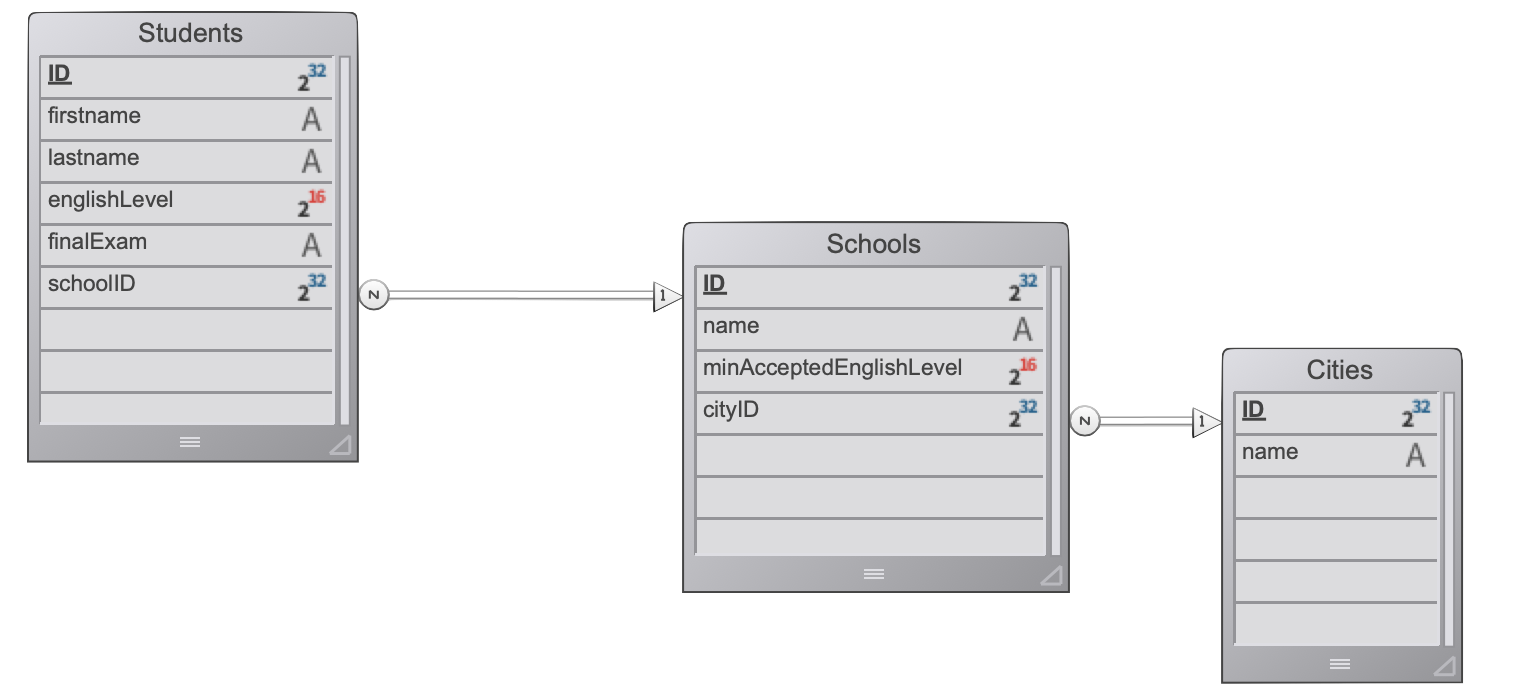In a previous blog post, you learned about ORDA classes and the possibilities they offer to make your coding experience smoother. In this blog post, you’ll see how to use them with the REST server.
Let’s see it in action!
HDI: Examples to use ORDA classes with REST server
We have a database named LearningSystem which contains the following tables:

This database is exposed as a REST server on localhost (port 8044). All of the defined functions in its classes can be called using REST requests in a POST operation.
Calling a function defined in the datastore class
The datastore object is retrieved using the /rest/$catalog prefix.
A getStatistics() function has been defined in the DataStore datastore class. The function returns a collection with information about the schools.
Class extends DataStoreImplementation
Function getStatistics
C_COLLECTION($0;$result)
C_OBJECT($obj;$school)
$result:=New collection()
For each ($school;This.Schools.all())
$obj:=New object()
$obj.name:=$school.name
$obj.city:=$school.city.name
$obj.numberOfStudents:=$school.students.length
$result.push($obj)
End for each
$0:=$result
You can call it with the http://127.0.0.1:8044/rest/$catalog/getStatistics URL.
Here’s the response from the server:
{
"result": [
{
"name": "Old school",
"city": "Solebury",
"numberOfStudents": 3
},
{
"name": "History Institute",
"city": "Solebury",
"numberOfStudents": 3
},
{
"name": "4D University",
"city": "Hummelstown",
"numberOfStudents": 3
}
]
}
Calling a function defined in a dataclass class
A dataclass object is accessed via the /rest/dataClassName prefix.
A registerStudent() function has been defined in the Schools dataclass class. The function receives student’s data in an object and checks if the student’s English level meets the school’s required level. If their English level is OK, the function creates and saves the Students entity.
Class extends DataClass
Function registerStudent
C_OBJECT($1;$data;$student;$school;$result;$0)
$data:=$1
$school:=ds.Schools.query("name = :1";$data.schoolName).first()
$result:=New object("success";True)
If ($data.englishLevel < $school.minAcceptedEnglishLevel)
$result.success:=False
$result.statusText:="The english level is not enough"
$0:=$result
End if
If ($result.success)
$student:=ds.Students.new()
$student.fromObject($data)
$student.finalExam:="To take"
$student.school:=$school
$result:=$student.save()
$0:=$student
End if
It’s accessible through the http://127.0.0.1:8044/rest/Schools/registerStudent URL.
The parameters must be passed as a collection, in the body of the request:
[
{
"firstname": "Mary",
"lastname": "Smith",
"englishLevel": 2,
"schoolName": "Math school"
}
]
Here’s the response from the server:
{
"__entityModel": "Students",
"__DATACLASS": "Students",
"__KEY": "9",
"__TIMESTAMP": "2020-06-03T13:08:13.542Z",
"__STAMP": 1,
"ID": 9,
"firstname": "Mary",
"lastname": "Smith",
"englishLevel": 2,
"schoolID": 4,
"finalExam": "To take",
"school": {
"__deferred": {
"uri": "/rest/Schools(4)",
"__KEY": "4"
}
}
}
Calling a function defined in an entity class
An entity object is accessed via the /rest/dataClassName(key) prefix, where key is the primary key of the entity.
A studyingInSameCity() function has been defined in the StudentsEntity entity class. It returns all other students studying in the same city as the current Student.
Class extends Entity
Function studyingInSameCity
C_OBJECT($0;$city)
$city:=This.school.city
$0:=$city.schools.students.minus(This)
This example is for an entity with primary key = 7. It’s accessed via the http://127.0.0.1:8044/rest/Students(7)/studyingInSameCity/?$attributes=firstname, lastname URL.
We apply the studyingInSameCity() function on this entity and filter the returned attributes to get only firstname and lastname (/?$attributes=firstname, lastname).
Here’s the response from the server:
{
"__DATACLASS": "Students",
"__entityModel": "Students",
"__GlobalStamp": 0,
"__COUNT": 3,
"__FIRST": 0,
"__ENTITIES": [
{
"__KEY": "5",
"__TIMESTAMP": "2020-06-16T13:59:51.095Z",
"__STAMP": 1,
"firstname": "Ricky",
"lastname": "Coyle"
},
{
"__KEY": "6",
"__TIMESTAMP": "2020-06-16T13:59:51.095Z",
"__STAMP": 1,
"firstname": "Alonzo",
"lastname": "Zapata"
}
],
"__SENT": 3
}
Calling a function defined in an entity selection class
An entity selection object can be accessed via the filter syntax. For example, /?$filter=”finalExam=’To take'” to get all of the students with a value of “To take” for the finalExam attribute.
An entity selection can be accessed through other ways, too so be sure to check the documentation.
A setFinalExam() function has been defined in the StudentsSelection entity selection class. It updates the finalExam attribute of each student with the given value.
Class extends EntitySelection
Function setFinalExam
C_TEXT($1;$value)
C_OBJECT($student;$status;$0)
$value:=$1
For each ($student;This) Until (Not($status.success))
$student.finalExam:=$value
$status:=$student.save()
End for each
$0:=$status
In this example, it’s accessible through the http://127.0.0.1:8044/rest/Students/setFinalExam/?$filter=”finalExam=’To take'” URL.
Here’s the body of the request:
[
"Passed"
]
Here’s the response from the server (all of the concerned students have been properly updated):
{
"result": {
"success": true
}
}
Download the HDI to see all the above in action.
Note:
Be sure to check out this post about keywords. Since 4D v18 R5, functions are not exposed by default. Don’t forget to mark the functions you want to expose!

